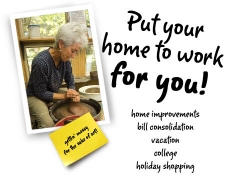Over half of poll respondents believe home ownership encourages excessive debt. Is the glass half full? Is public becoming more aware of the true cost of ownership? Is the glass half empty? Is the public becoming apathetic to the huge debt burdens they are asked to take on.


Irvine Home Address … 172 GARDEN GATE Irvine, CA 92620
Resale Home Price …… $555,000
They say the sea turns so dark that
You know it's time, you see the sign
They say the point demons guard is
An ocean grave, for all the brave,
Was it you that said, “How long, how long,
How long to the point of know return?”
Kansas — Point of No Return
The Ponzi moment
Debt is only a problem for those who plan to pay it off. Ponzis, and sophisticated personal financial managers, use debt as a tool. If debt is on a house Ponzis can borrow against, the house is given the responsibility for paying off the debt. This shifting of responsibility is the Ponzi moment.
Going Ponzi is a psychological event. It occurs when the debtor comes to believe they will never pay off a debt with their wage income. They abdicate responsibility for repayment to the house itself. For Ponzis debt is not a problem. Only the inability to obtain more debt slows down a Ponzi.
If the Ponzi mind becomes widespread, house prices get bid up by those willing to pay any price to obtain free HELOC money. The rest of the world — the people who plan to pay down a mortgage with their wage income — they are faced with paying the Ponzi premium, and they face the risk of loss if they want to liquidate after one of the inevitable market crashes.

Americans dream for a home on unstable ground
By Tara Tran • Apr 5th, 2011 • Category: April 2011 Journal, Journal Articles, Lead Article
This article reviews a recent poll on American attitudes towards owning a home in light of the Great Recession and the housing crisis, and reevaluates the place of homeownership in the American Dream.
Homeownership is at home in the American Dream
Eighty percent of Americans believe it is of total importance they buy a home one day, 90% say they would buy their current homes again and 70% would advise their family and friends to purchase a home as a valuable long-term investment. Clearly the vast majority of Americans still sport a decisive thumbs up to homeownership despite the risk of loss inherent in homeownership made evident by the Great Recession and the housing crisis.
Our concepts of ownership are primal. Our desire to possess and defend a territory is rooted in basic survival needs for food and shelter. Irrespective of what happens to the price of shelter, people are going to desire it.
What's truly delusional is the despite the long-term losses people are going to endure, so many would still advise their friends and family to commit the same financial mistake and purchase a house as an investment. It is consumption, not investment.
All this is according to the latest Allstate Insurance and National Journal Heartland Monitor Poll which Financial Dynamic conducted to monitor middle-class America’s maneuvers in the economy’s post-recessionary aftermath. (The poll recorded a +/- 3% margin of error for 1000 respondents.) [For more information on the “Homeownership and the American Dream” poll, see National Journal article, A Solid Foundation: Why Americans still long for their own homes.]
The American Dream of wealth and independence sustains American homeownership, a national aspiration which is the result of society’s suspension of disbelief in the myth that home prices continually go up.
It does require an amazing cognitive dissonance to ignore the crash and continue to cling to old fantasies, or even deny the crash entirely. People filter data to see what they want to see.
For example, two-thirds of those Americans polled experienced some type of financial distress such as an underwater mortgage and still believe owning is better than renting.
It takes a great deal of faith in appreciation to believe ownership is better than renting when (1) the cost of ownership is higher than renting and (2) owning prohibits moving without a short sale. Trapped in an expensive money-rentership arrangement doesn't sound better than the cost savings and freedom of renting.
Seventy-five percent believe homeownership will help them achieve the American Dream, compared to the 22% who believe otherwise, and 80% believe owning a home is an integral piece of the American Dream, second only to raising a family.
Californians polled in the survey generally exhibit the same level of national spirit for homeownership ― 68%, compared to the national 75%, believe owning a home will help them live the Dream. In addition, 83% believe owning is a better financial decision than renting, and 71% would advise family and friends to buy a home to build long-term assets. (The poll’s California data recorded a +/- 10% margin of error for 99 respondents.)
Optimism and persistence are American
Homeownership is not solely an economic decision. The American image of the home is deeply imbued with social and cultural sentiments. Though 25% believe owning a home is the best type of investment for their money only behind a retirement plan, 60% in the survey view homeownership chiefly as a means to settle down and raise a family. Thirty-six percent view homeownership as an opportunity to build equity.
I wonder what percent in California would say home ownership is an opportunity to get free spending money? I bet it's higher than 36%.

The general consensus is present economic troubles and housing market miseries are but minor impediments to the American Dream. Sixty-three percent of Americans and 67% of Californians trust the housing crisis is temporary and the housing market will improve. Nationwide 60% believe their skills coupled with a tough work ethic ― rather than the economy ― has the most impact on their ability to achieve the Dream.
It's good to know more than half still believe they have to work and contribute in order to achieve their dreams. If we every lose that, we are doomed as a nation.
Splintered views in uncertain times
Though many Americans are convinced they control their own Dream, the Great Recession and the housing crisis cast doubt over what part the government plays in subsidizing American homeowners. Americans and Californians are split over the matter. Fifty percent of the nation and 42% of the state want to reduce the role of government agencies like Fannie Mae and Freddie Mac, yet 42% nationwide and 52% statewide want the government to continue its role. On the home mortgage tax deduction question, 50% want the government to keep the subsidy, while 43% want to limit or eliminate it. Californians polled at 56% to keep the subsidy and 37% to trim it down or cut it out. [For more information on getting rid of the home mortgage tax deduction, see the February 2011 first tuesday article, The home mortgage tax deduction: inducing debt and stifling mobility.]
I think it's interesting that nearly half would like to see the GSEs disappear along with the mortgage interest deduction. That represents a significant change of thinking since the bubble popped in 2006.
It should be noted the poll shows some Americans appear misinformed about how the government housing policy works. Seventy-five percent report they have not benefited from federal homeownership policy even though 71% report they have taken a home mortgage tax deduction.
Americans do not understand the myriad of ways government policy impacts the housing market. It isn't surprising that 75% don't realize they benefit in some fashion (how many have government-backed loans?)
The same level of ambivalence exists on the question of whether homeownership stabilizes American society. Forty-two percent agree homeownership has created stable communities because it encourages people to actively invest in a neighborhood and its surrounding area. However, 51% think homeownership encourages people to incur high amounts of debt, which renders them unable to pay their mortgages if they lose their jobs, and results in increased foreclosures and blighted communities.
The community benefits of home ownership are overshadowed by the harsh reality of dodgy loans creating blight and foreclosures. Remember Vicente the Fox?
California’s response to the relationship between homeownership and the health of a community differed from national results, which is not surprising since the state has been hit much worse by the housing crisis than the rest of the country. Seventy-seven percent of Californians report their homes have decreased in value (fact: all have decreased), compared to the 41% nationwide, and 40% say their homes are underwater, compared to the 18% nationwide.
The other 23% are the permanently kool aid intoxicated or completely oblivious.
As a result, 61% of Californians believe homeownership has only made communities less stable.
Home ownership didn't destabilize communities, loan ownership did.
Younger Americans surveyed seemed the most uncertain about buying a home, but overall, the poll demonstrates the economic down has caused Americans to ask questions about homeownership and the American Dream, but it has not budged their desire for it.
Time to reevaluate the Dream
Americans, and Californians included, are split or confused on what role the government has on the issue of homeownership. They are divided as to whether the government should continue to intervene in the housing market.
Americans crave homeownership, even if they understand they will have to trudge through the backwash of another cyclical recession and accompanying housing crash. But Americans need to distinguish: the Dream is homeownership, not homedebtorship, as promoted by interest deductions. The craving however is not the result of tax policies, which if eliminated would not alter the American compulsion to own and gain wealth.
Homeownership is not for everyone, and those who are forced to finance that acquisition might ask themselves whether owning is the right decision. The job mobility provided by renting is what has always enhanced California’s economy, attracting the most creative and industrious people in the world. Here, homeownership is near 50% of those housed in California, while the rest of the nation ranges around 70%.
The real estate industry calls the mortgage interest deduction the “catalyst of the American Dream,” but an American Dream based on irresponsible indulgence has more costs than benefits. [For more information on the housing subsidy problem, see the December 2010 first tuesday article, The mortgage interest tax deduction imbroglio – the squabble continues.]
At its very core, a home is a form of shelter, a basic life necessity. However since the 1970s, national public policy encouraged and exploited by lenders, builders and brokers marketed homeownership as a symbol of success and autonomy. The glamorous spotlight on the accessibility of homeownership for everyone thus casts a shadow of disapproval on renting, but what is there to be embarrassed about when paying cash to buy a home? If being in debt is a foundation to homeownership in America (and one of the reasons for the housing crisis), then Americans need to change their attitudes towards homeownership. Dreaming about homeownership is laudable, but on a solid foundation. [For more information on the trends of American attitudes towards housing, see the October 2010 first tuesday article, Is homeownership a luxury or necessity?]

$417/SF in debt
These little houses carry a remarkable amount of debt. I really like this neighborhood, but the prices of houses here are extraordinarily high on a per-square-foot basis. Today's featured property was purchased on 11/29/2004 for $520,000. The owners used a $416,000 first mortgage and a $104,000 down payment. They refinanced on 10/13/2005 with a $420,000 first mortgage and a $80,000 second mortgage. They withdrew all but $20,000 of their down payment.
They are priced to sell at breakeven in hopes of capturing the remainder of their down payment. However, since they are the highest priced home in Northwood on a per-square-foot basis, I have my doubts whether they will get their money back.


Irvine House Address … 172 GARDEN GATE Irvine, CA 92620 ![]()
Resale House Price …… $555,000
House Purchase Price … $520,000
House Purchase Date …. 11/29/2004
Net Gain (Loss) ………. $1,700
Percent Change ………. 0.3%
Annual Appreciation … 1.0%
Cost of House Ownership
————————————————-
$555,000 ………. Asking Price
$111,000 ………. 20% Down Conventional
4.84% …………… Mortgage Interest Rate
$444,000 ………. 30-Year Mortgage
$112,834 ………. Income Requirement
$2,340 ………. Monthly Mortgage Payment
$481 ………. Property Tax (@1.04%)
$150 ………. Special Taxes and Levies (Mello Roos)
$116 ………. Homeowners Insurance (@ 0.25%)
$134 ………. Homeowners Association Fees
============================================
$3,221 ………. Monthly Cash Outlays
-$398 ………. Tax Savings (% of Interest and Property Tax)
-$549 ………. Equity Hidden in Payment (Amortization)
$206 ………. Lost Income to Down Payment (net of taxes)
$69 ………. Maintenance and Replacement Reserves
============================================
$2,549 ………. Monthly Cost of Ownership
Cash Acquisition Demands
——————————————————————————
$5,550 ………. Furnishing and Move In @1%
$5,550 ………. Closing Costs @1%
$4,440 ………… Interest Points @1% of Loan
$111,000 ………. Down Payment
============================================
$126,540 ………. Total Cash Costs
$39,000 ………… Emergency Cash Reserves
============================================
$165,540 ………. Total Savings Needed
Property Details for 172 GARDEN GATE Irvine, CA 92620
——————————————————————————
Beds: 2
Baths: 2
Sq. Ft.: 1200
$462/SF
Property Type: Residential, Single Family
Style: Two Level, Cottage
Year Built: 1998
Community: 0
County: Orange
MLS#: S652006
Source: SoCalMLS
Status: Active
On Redfin: 17 days
——————————————————————————
Charm galore in this 2 bedroom plus den cottage home in Northwood Pointe. Light & open floorplan features living room w/ built ins, gourmet kitchen w/ sparkling white counters & cabinets, & dining area w/ cozy fireplace.  All rooms are open to each other, making this a perfect floorplan for living & entertaining. Gorgeous slate tile flooring accents the main floor. Tranquil master bedroom features bath area with dual sinks, travertine tile floors, & walk in closet. Second bedroom has it's own private full bath w/ travertine tile floor. The versatile den could also be used as an office, playroom, nursery, workout room, or craft area. Your yard & outdoor living area is highlighted by a custom built in BBQ area w/ sink & slate topped dining bar, a patio trellis with outdoor lighting, & mature trees for privacy. Enjoy relaxing in this tranquil oasis at the end of the day. 2 car garage has built in storage. Walking distance to award winning Canyon View Elementary & Northwood High. A real gem!
All rooms are open to each other, making this a perfect floorplan for living & entertaining. Gorgeous slate tile flooring accents the main floor. Tranquil master bedroom features bath area with dual sinks, travertine tile floors, & walk in closet. Second bedroom has it's own private full bath w/ travertine tile floor. The versatile den could also be used as an office, playroom, nursery, workout room, or craft area. Your yard & outdoor living area is highlighted by a custom built in BBQ area w/ sink & slate topped dining bar, a patio trellis with outdoor lighting, & mature trees for privacy. Enjoy relaxing in this tranquil oasis at the end of the day. 2 car garage has built in storage. Walking distance to award winning Canyon View Elementary & Northwood High. A real gem!


California expands its foreclosure relief effort
The California Housing Finance Agency will now allow homeowners who refinanced their properties for cash or took out home equity lines of credit to participate in three of its four programs. They had initially been excluded.
http://www.latimes.com/business/realestate/la-fi-keep-your-home-20110406,0,2942301.story?track=rss&utm_source=feedburner&utm_medium=feed&utm_campaign=Feed:+latimes/mostviewed+(L.A.+Times+-+Most+Viewed+Stories)
You have to work really hard to come up with a $2 Billion dollar fund that has -100% return.
Only the California government is capable of such a feat. It helps when you aren’t spending your own money I suppose. All of us responsible folks have a share. The debtors can thank us for making this possible. All you renters out there make sure to send the check, oh wait never mind they will take it out of your pay automatically. The bills are coming due for the debtors that stuck around and they need a nice house to live in.
Thank god this is federal money, it’s nice to know the Laura Louzaders in the non bubble fly over states are lending their hand in this great time of need.
Whoever said life was fair was either not playing the game or making the rules.
I have news- Chicago experienced a massive bubble and our laughably overbuilt condo market has totally collapsed. Cook County has about 1200 REO houses and condos on the multilist, and a “shadow” inventory of over 28,000 REO properties.
Yes, these are REOs, already bank owned. That figure does not include deeply underwater properties, properties delinquent on payments but not yet being foreclosed, properties in some stage of foreclosure, or short sales. There are many, many developer foreclosures on converted buildings in my neighborhood, and on massive 60 story 600 unit buildings in the South Loop, River North and South Streeterville. Here, too, one bank has published a list of buildings that it will not write mortgages in because these buildings, mostly new construction or new conversions, are so burdened with foreclosures and unpaid assessments that it’s inevitable that more of their paying owners still there will be driven underwater and out the door by the extra assessments to offset all the non-paying delinquent owners.
I waited for the bubble to break from 2002 to 2004, by what time it was glaringly evident that there was, as Paul Volker put it in 2004, “excessive risk” in the system, and the tower of debt and debt derivatives was utterly out of control, with something like $400 Trillion (that’s not a typo) worth of debt derivatives against $40 Trillion worth of overvalued mortgages.
The bubble and its fallout not only deprived me of a decent place at a decent price, but destabilized my job and endangered my retirement, left millions of other unemployed, and deprived our children of a decent future. It is profoundly depressing to consider what awaits young people who’ve gone deeply into debt to finance educations in demanding professions such as engineering and the hard sciences, just to confront rapidly shrinking opportunity with fewer job niches every year, stuck my elderly mother with stratospheric property taxes while reducing her interest income on her savings to nearly zero, the better to induce her to invest in a stock market that looks rigged to blow any day.
We who are not the bonus boyz of the financial cartel are paying and will keep on paying for this in thousands of ways- taxes, losses, lost opportunity, a destabilized job market, higher property taxes, and a reduced standard of living for at least another 20 years.
Another backdoor giveaway to mortgage Pimps.
Note that the change of heart is supposedly unemployment of Californians. Yet nobody is talking about creating makework for the unemployed. No no, the money is earmarked and set aside for mortgage payments. They don’t want to just hand everyone a check because then the people might spend the money on food rather than the mortgage.
As usual, unemployed renters need not apply for any “help”. Go find a homeless shelter. Throw another rat on the barbie.
Yes, it is all about that pesky unemployment. It has nothing to do with squatters not paying the mortgage or way too many foreclosures that banks can’t handle. Yes, it is all about unemployment, starving children, and AIDS in Africa when the Politicos need to launder some money to their buddies.
Get ready for another round of “disappointment” and righteous indignation in the coming months when the foreclosures continue to skyrocket despite all of the “help” with the bankers and the politicians crying right along with the masses and laughing it up on the Golf Course.
David, everyone needs to pitch in to get them current on their mortgages.
It will help out the children.
The children of the bankers.
Sad but true,
Heads they win, tails you lose.
Money controls everything.
What I found interesting during the price increases of the bubble was that even as prices and values were increasing, overall equity as a % of total household real estate assets was decreasing. This was also happening as households were aging. IMO, as you age, your equity position in your home should increase not decrease.
On an aggregate, you can increase the price of debt-fueled assets by just decreasing the equity. If we had $20 Trillion in assets and 50% in equity, we could keep the same dollar value of equity, but have $40 Trillion in assets with a shift to 25% equity.
A good way to measure Ponzi-Factor is how many households are paying > 30% (or an even higher %) towards a mortgage. There are many reasons why someone would devote that much of their income to a mortgage, but the main one is the hope for appreciation.
For a given property most MLS listings will quote a $price/sqft value.
I have often wondered if it would be possible to calculate (in an automated way) $debt/sqft and $equity/sqft.
If Ziprealty or Redfin or others could calculate,
it sure would help to evaluate a specific property.
In aggregate, such data would provide some very interesting trendline statistics.
Can anybody explain?
I pay a huge sales tax when I buy a used car, and then pay annual taxes on it. And the seller has already paid sales tax on the car when it was registered.
But a house buyer pays no sales tax; though, it’s used to pay salaries to teachers, firefighters, police who increase the value of the home.
A sales tax will discourage flippers from speculations.
In NC, you do pay a ‘sales tax’, but it is the cost of the ‘document stamp’ on the deed transfer. However, that is only 0.2% (2$ for each 1k of sale price). A larger real-estate transfer tax was proposed, and you can guess who was against it whole-heartedly (NAR & NCAR).
I would also like to see a tax on a sale of a mortgage note (or other financial instrument) as well, by the same logic. If flipping homes is bad, why is flipping stocks good?
You can’t avoid taxes when you flip stocks.
I think you have to pay 25% of your profit if you don’t keep stocks for long enough time.
Yeah, different lobbies are killing America.
* Banking lobby
* Military lobby
* Real Estate lobby
* Medical lobby
…
But no Renter Lobby.
Huh? Short-term capital gains (< 1 year) are taxed at the seller's ordinary income tax rate. The last thing we need in California is more taxation.
There is a huge difference in a transactions tax and a capital gains tax. (Using a bank-centric example) If you borrow $1Billion to end up making 1% on a transaction, that is $10M in cap gains, for a tax in the ballpark of $2.5M. If there was a 1% transactions tax, you would not make the transaction because that 1% gain would not have been there. Lots of banks and financial players make their money picking up nickels in front of a steamroller (nod to Lowenstein). Good business until the steamroller catches up.
These types of small profits in highly leveraged situations are destabilizing. Who pays for the eventual stabilization needed? Taxpayers. That is the justification for taxing those transactions.
How funny!
They asked people in NC to vote if they wanted new taxes. Certainly, everybody voted against taxes.
Only a dictator will be able to balance the US balance.
Gotta wonder about that. it’s raise taxes, cut spending, or just print it and let the debt inflate away. Can’t help notice gold & stock market rising lately … perhaps in anticipation of the answer.
At some point, the economy will actually improve. At that point, interest rates will rise, and there will be real pressure on the deficit. Then taxes will go back up, and much spending will already have gone down (less unemployment to pay when UE is at 5% than when it’s at 10%). Interest rates rising will be the precipitating factor causing tax rates to go up.
That would be a massive tax bill… I guess it’s because they consider a home an essential good, like milk & bread, which is not taxed either. Not opposed to sales tax on real estate, but I think that might have to come with a revised sales tax rate. Or at least a much more controlled process of rate revision. It’s much too easy for the state govt to play around with it right now.
flippers are not the problem. government involvement is the problem.
another tax will solve nothing.
Who will cover the losses of “innocent victims of predatory lending” if there are no new taxes?